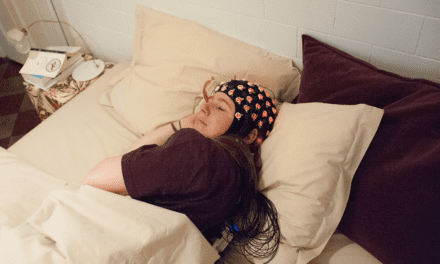A new study shows that, even in an urban population experiencing disrupted sleep, people experience longer REM sleep in winter than summer and less deep sleep in autumn.
The study, published in Frontiers in Neuroscience, finds that changing day length and light exposure over the course of the year affects the duration and quality of sleep, suggesting that seasonal adjustments to work and school schedules could benefit society.
“Possibly one of the most precious achievements in human evolution is an almost invisibility of seasonality on the behavioral level,” says Dieter Kunz, MD, corresponding author of the study, based at the Clinic of Sleep & Chronomedicine at the St. Hedwig Hospital, in a press release. “In our study we show that human sleep architecture varies substantially across seasons in an adult population living in an urban environment.”
The study analyzed 292 patients who had undergone polysomnographies at the St. Hedwig Hospital. These studies are regularly carried out on patients who experience sleep-related difficulties. Although the sleep disorders could potentially affect the results, this makes for a large study group evenly spread throughout the year, allowing for the investigation of month-to-month differences.
The team excluded patients who were taking medications known to affect sleep, technical failures during the polysomnography, and REM sleep latency longer than 120 minutes, which suggested that the first REM sleep episode had been skipped. Once these exclusions had been made, 188 patients remained. Most of their diagnoses showed no seasonal pattern, but insomnia was more commonly diagnosed toward the end of the year.
Even though the patients were based in an urban environment with low natural light exposure and high light pollution, which should affect any seasonality regulated by light, the scientists found subtle but striking changes across the seasons. Although total sleep time appeared to be about an hour longer in the winter than the summer, this result was not statistically significant.
However, REM sleep was 30 minutes longer in the winter than in summer. REM sleep is known to be directly linked to the circadian clock, which is affected by changing light. Although the team acknowledged that these results would need to be validated in a population that experiences no sleep difficulties, the seasonal changes may be even greater in a healthy population.
Although most people’s waking time is currently largely out of their control due to school or work schedules, society might benefit from accommodations that would allow humans to respond more effectively to the changing seasons, according to the study. In the meantime, going to sleep earlier in the winter might help accommodate human seasonality.
“Seasonality is ubiquitous in any living being on this planet,” says Kunz in the press release. “Even though we still perform unchanged, over the winter human physiology is down-regulated, with a sensation of ‘running-on-empty’ in February or March. In general, societies need to adjust sleep habits including length and timing to season, or adjust school and working schedules to seasonal sleep needs.”
Photo 79852896 © Syda Productions | Dreamstime.com





